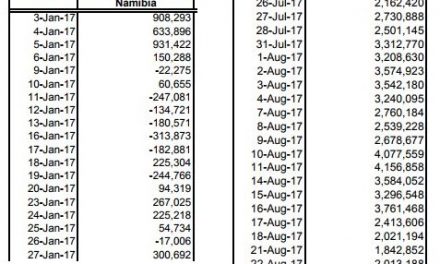
Finding a stick to hit the dog will backfire on agriculture
Policy interference in free market mechanism has lead to an astronomical rise in the price of agricultural land far outstripping the average annual inflation rate. Now, it seems lack of policy is interfering again with the market, only this time it is the number of cattle exported on the hoof to South Africa.
Meatco announced earlier this week it is forced to scale down its slaughter operations due to a lack of throughput. Now, this is an economic anomaly in the extreme. A few months ago, commercial farmers complained they were not receiving slaughter permits fast enough, and now it seems, there are not enough cattle to keep two export abattoirs running. A look at the data provides a clear explanation why the national meat processors and exporter is hitting on tough times. This same data also indicates a marked shift in government policy, or at least sentiment. As an outsider, I am wondering how much of this stems from the agriculture ministry in a deliberate attempt to put Meatco under strain.
In 2012 which was a fairly normal rainfall year, live cattle exports ran between six thousand and ten thousand animals per month for the first semester. It was at this same time that government, rather vocally, revealed its intention to curb the export of live animals. Remember, they were still trying to feed us the rationale for the intended export levies, and cattle on the hoof was identified as one of the key commodities that leave Namibia unprocessed. So, obviously, this too had to be subjected to an export levy.
Then came the Meatco dispute with the meat processor rebutting the minister on every count with arguments based in law, that is the Meatco Act which governs its operations. In civilised countries this is called Rule of Law. While the dispute between Meatco and the ministry raged on, it became clear government had a hidden agenda of taking over a large chunk of the shareholding of Meatco without paying for it. In other words, no willing seller, willing buyer principle. As the fight intensified, I was amazed at the level of disregard shown by the ministry for Namibian legislation.
Fortunately, it was exactly the Meatco Act that came to the rescue every time of the beleaguered national slaughter house. Meatco, by law, belongs to its members, and on this point the ministry failed to impress the members with strong points in law, that it has a rightful demand on a portion of the shareholding. Every new attempt at partial nationalisation or taking control by controlling the board through proxy nominees, was voted down by the members.
Then this year, the red meat industry was struck by the severe current drought. A common sense conclusion is that the number of cattle offered for slaughter must rise sharply, hence the earlier complaints about slaughter permits. This was indeed the case, until about April when the trend suddenly reversed, and slaughter volumes came down sharply. The outcome was the announcement this week that there is not enough cattle to keep both the Okahandja and the Windhoek abattoirs running.
This begs the question, what has changed so dramatically that in the wake of a severe drought, slaughter volumes are decreasing and not vice versa. The answer lies in the live export data. January this year saw permits issued for export of around 11,000 animals. This figure almost doubled for February and then gave another massive jump in March to over 27,000 animals. For April, May and June, the permits issued for live export continued to grow, first topping 24,000 and then 25,000 animals. The total number of cattle exported to South Africa by the end of June, year to date, exceeds 130,000 while last year the first semester did not make 50,000. That is a 160% increase.
If this is not a case of double standards, or indicative of a serious hidden agenda, then I do not know what else will qualify for this definition. First we are told live exports must be stopped, or the producers must be liable to a punitive export levy. Then comes the drought and it is used as pretext to suddenly allow live exports. The next thing you know, against all rational considerations, Meatco says it is in trouble and must run its two abattoirs on alternating shifts.
I get the impression, the value of Meatco in the food export chain is not appreciated. I also distinctly sense the government does not realise how difficult it is to establish consumer markets in Europe where there is no shortage of prime beef. If the drought is the reason for the increased exports, why does it no longer show in Meatco’s throughput?










































